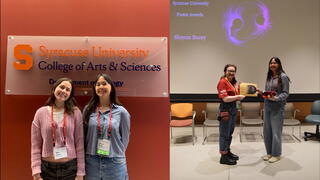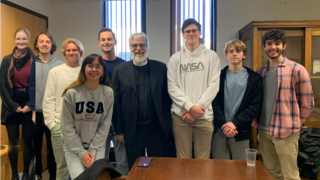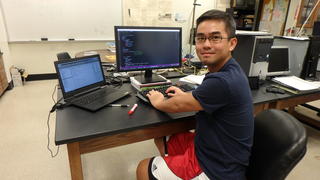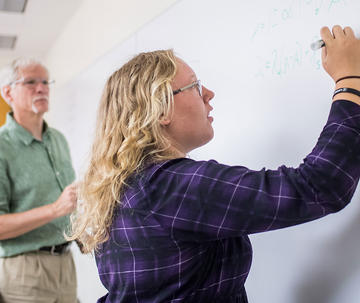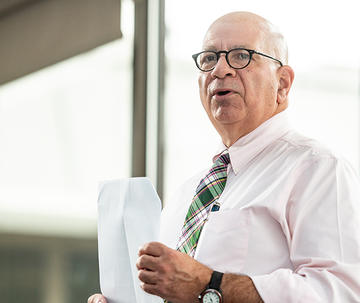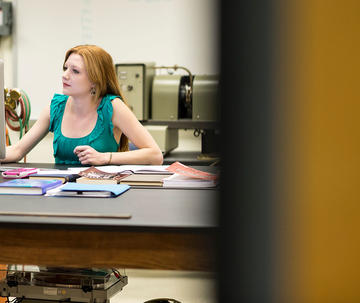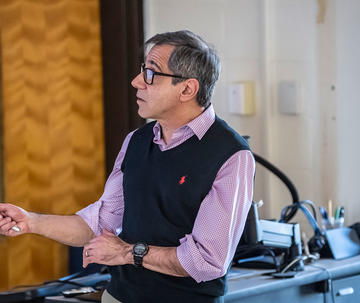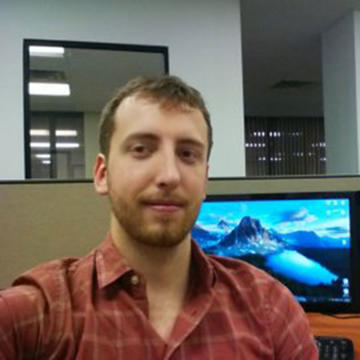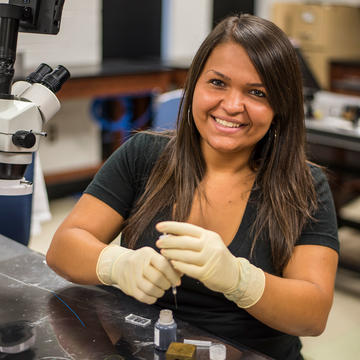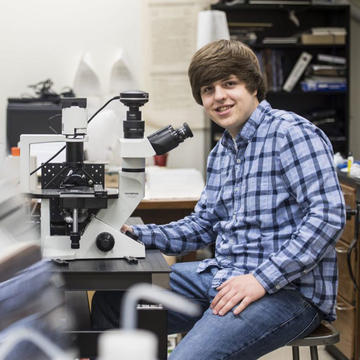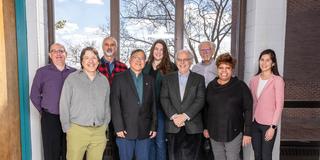
Department of Physics
The Department of Physics is a community of faculty, staff, students and alumni dedicated to excellence in education in general and excellence in physics education in particular. As a physics student, you will study the properties and behavior of matter and energy in a wide variety of contexts, ranging from the sub-microscopic particles from which all ordinary matter is made (particle physics) to the behavior of the Universe as a whole (cosmology).
The Department of Physics is excited to announce the launch of a new major in Engineering Physics starting Fall '25 semester, designed for students interested in applying fundamental physics principles to solve complex engineering problems. This interdisciplinary program combines rigorous training in physics with core engineering courses, preparing graduates for careers in advanced technology, research, and innovation. The new major aims to bridge the gap between theoretical science and practical application, offering students a strong foundation for graduate study or immediate entry into high-tech industries. For more information please visit Engineering Physics major website.
We warmly congratulate the ten graduating students from our physics program on their remarkable achievements and exciting futures. Each of them is embarking on a unique path—from pursuing advanced degrees in Medical Physics, MD/PhD programs, and engineering, to exploring opportunities in research, technology, and beyond. Their diverse directions reflect both the rigor of their education and the breadth of their ambitions. We are proud of their hard work, resilience, and curiosity, and we look forward to seeing the impact they will make in their chosen fields. On behalf of the department, we wish them continued success and fulfillment in all their endeavors!
The Department of Physics offers a BS in Physics and a new BS in Engineering Physics. The Physics program has various advisory tracks (Biophysics, Materials Science, Astrophysics, Computational Physics, Physics Education, and General) with a very flexible curriculum which allows the students to pursue their interests. The new major will combine the foundational principles of physics with engineering. Students with this degree will be prepared to embrace a career in engineering and advanced fields in Science and Technology. The program has 3 concentrations: Quantum Engineering, Electrical Engineering and Biomedical Engineering.
The Department of Physics has developed a research-oriented culture for both its faculty and students. It is expected that most students will be involved with some level of research activity over their four-year development in the discipline of physics. The ability to put into practice what is learned in the classroom is paramount to your growth as a young scientist.
In the research laboratory, you will learn to ask appropriate questions, design and perform experiments to answer those questions, analyze data using computational methods and draw appropriate conclusions. Students will also be exposed to the interfaces of physics and biology and physics and chemistry, exposing them to how the methods of physics are central to addressing key problems in other disciplines.
Student Activities
To learn about student activities please visit:
News & Announcements
Why study Physics?
-
Physics truly is one of the most exciting and interesting subjects one can study. Discoveries from physics have revolutionized the world and will certainly continue to do so. Between the innermost workings of the nucleus and the outer edges of the visible universe lies the playground of physics. Combining imagination with systematic reasoning, the physicist seeks to understand the laws of nature, the structure of matter and the behavior of physical processes — the keys to many of the universe's secrets. The area of physics covers such intriguing topics as lasers, superconductors, black holes, quantum mechanics, big bang theory, relativity and more. It also covers more basic but still fascinating questions such as why the sky is blue, why sunsets are red and why ice floats. In short, physicists are explorers trying to understand the world around them.
-
Physics is sometimes referred to as the "liberal arts" degree of technology because physics majors can go on to careers in fields such as computer science, engineering, research and development and biology. Obtaining an undergraduate degree in physics is a way to keep your options open. It tells prospective employers this person has what it takes to succeed. The physics major learns to start with an ill-posed problem, formulate it quantitatively, solve it and communicate the results clearly — skills that transfer readily to many fields. The American Institute of Physics has the latest data available on employment and career trends in physics.
-
The physics department graduates about 3-5 majors each year which means that there are only 3-10 students in each physics majors course. This means that you'll get more personalized attention.
-
Physics majors have a reputation for solid mathematical skills, strong problem-solving ability and good work ethic. It is these fundamental skills that allow them to work successfully in so many different areas.
-
According to data from the American Institute of Physics, students who major in physics often pull in high starting salaries.
Alumni Spotlight
![ryan stull '15]()
I graduated from Saint Joseph's in 2015 where I majored in physics and computer science. While at St. Joe's, I learned about physics, computers, software and mathematics. However, the most important thing I learned was to push myself. That work ethic is something that has helped me in every aspect of my life. Currently, I'm working at Impact Inc. as a big data engineer. I work on the data platform team where we deal with the movement, storage and processing of the vast amounts of data that come in."
![gianna valentino]()
I received my B.S. in physics with a minor in mathematics from Saint Joseph's in 2014. Thereafter, I attended Johns Hopkins University and completed my Ph.D. in mechanical engineering. In June 2020, I joined the Johns Hopkins Applied Physics Laboratory (APL) as a postdoctoral fellow in the Research and Exploratory Development Department. At APL, I was a part of the multifunctional materials and nanostructures group working on alloy design and development for high-temperature structural materials." I am currently an Assistant Professor of Materials Science & Engineering at the University of Maryland working on nanostructured materials.
![zachery brown]()
I graduated from Saint Joseph's in 2017 after majoring in physics and philosophy. During that time, I worked on several research projects in Piotr Habdas’s lab investigating the physical properties of dense colloidal materials. After graduation, I moved to Rochester, New York where I am currently living and pursuing a Ph.D. in physics from the University of Rochester. In my current research, I use maps of the structure of the universe to look for signatures of baryon acoustic oscillations, which are enormous sound waves in the early universe that affect where galaxies form."
